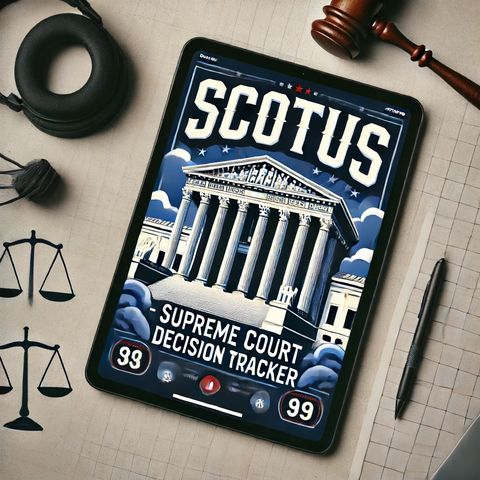Pivotal Supreme Court Rulings Reshape Voter Access, Abortion Laws, and Regulatory Authority

Download and listen anywhere
Download your favorite episodes and enjoy them, wherever you are! Sign up or log in now to access offline listening.
Pivotal Supreme Court Rulings Reshape Voter Access, Abortion Laws, and Regulatory Authority
This is an automatically generated transcript. Please note that complete accuracy is not guaranteed.
Description
The Supreme Court of the United States has recently made significant rulings affecting voter registration requirements and abortion legislation that create substantial legal shifts in various states. In a recent...
show moreIn a recent ruling, the Supreme Court affirmed that the state of Arizona has the authority to demand that some voters provide proof of citizenship. This decision supports Arizona's legislation that denies voter registration to individuals who fail to use a federal registration form which includes proof of citizenship. This judgment has stirred controversy, with critics arguing that it could lead to confusion and restrict voter access. Proponents of the law argue that it is necessary to maintain the integrity of elections, preventing voter fraud by ensuring that only eligible citizens cast ballots.
In another distinct ruling, the Arkansas Supreme Court delivered a verdict on a proposed amendment related to abortion. The court's decision meant that the amendment, which was aimed at expanding access to abortion within the state, will not appear on the November ballot. This denies voters in Arkansas the opportunity to vote on this particular legislative change this election cycle, effectively stalling efforts to modify or expand abortion access under existing state laws.
Supreme Court decisions also cast a shadow over regulatory practices in emerging technology sectors, particularly concerning defense. Traditionally, federal agencies such as the Department of Defense have enjoyed latitude under the doctrine known as "Chevron deference," a principle allowing agencies to interpret ambiguous statutes in their enabling legislation. However, recent court opinions suggest a growing skepticism of this deference, particularly in contexts involving complex and evolving areas like technology and defense.
These Supreme Court decisions underscore the broad and impactful role the court plays in shaping legislative practices and public policy across a range of issues from voter rights to women’s health and technological regulation. The repercussions of these rulings are likely to influence future legal interpretations, state policies, and the general landscape of American governance.
Information
| Author | QP-4 |
| Organization | William Corbin |
| Website | - |
| Tags |
Copyright 2024 - Spreaker Inc. an iHeartMedia Company
